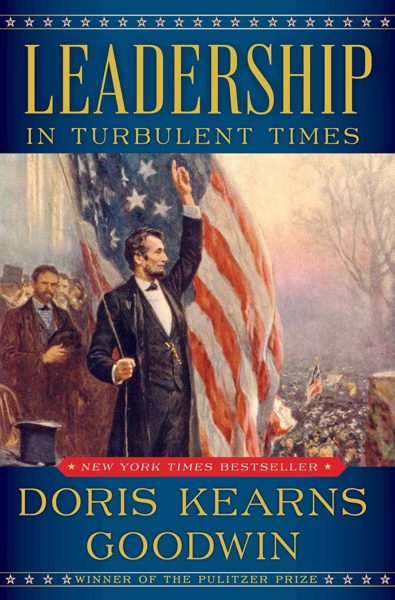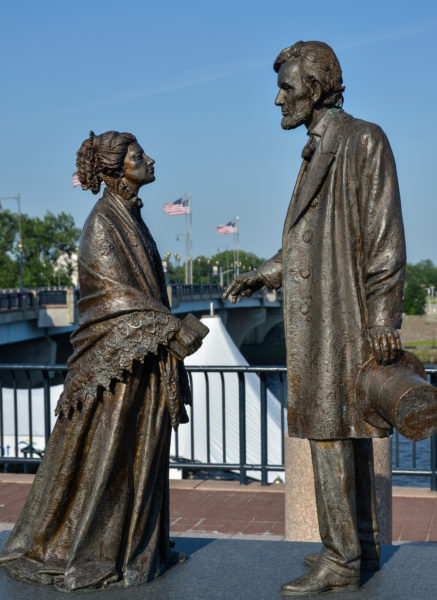Notable, quotable lines of inspirational leadership that Lincoln wrote (but never spoke)
 Inspirational leadership is what CEOs and business leaders everywhere strive constantly to provide. When leaders find themselves struggling to find just the right words, often it is helpful to go back in history for some quiet study and reflection.
Inspirational leadership is what CEOs and business leaders everywhere strive constantly to provide. When leaders find themselves struggling to find just the right words, often it is helpful to go back in history for some quiet study and reflection.
Abraham Lincoln is the first of four U.S. presidents examined in Doris Kearns Goodwin’s 2018 book, “Leadership in Turbulent Times.”
Lincoln, of course, is widely considered a master of oratory for his 272-word Gettysburg Address, dubbed “the great American poem” by poet Carl Sandburg.
But what about Lincoln’s State of the Union addresses delivered during the turbulent times of the U.S. Civil War?
Did these addresses include lines of inspirational leadership?
Lincoln himself never delivered his own State of the Union speeches. Back then, the President’s Annual Message to Congress, as it was called, was a written report given to Congress and read by a clerk at the end of the year, in December.
Nevertheless, Lincoln’s messages demonstrating inspirational leadership – which he penned himself – were written to be read aloud. At times, they included rhythm, rhyme and rhetorical devices that make for memorable lines, even though Lincoln’s speeches were distributed primarily as printed text since the technology to record voices had not yet been invented.
Here are seven of the most notable, quotable lines of inspirational leadership from Lincoln’s four State of the Union addresses in 1861, 1862, 1863 and 1864.
They are worthy of quiet study and reflection by leaders today, more than 150 years later.
“The struggle of today is not altogether for today; it is for a vast future also. With a reliance on Providence all the more firm and earnest, let us proceed in the great task which events have devolved upon us.” (Dec. 3, 1861)
~~~
“ … and while it has not pleased the Almighty to bless us with a return of peace, we can but press on, guided by the best light He gives us, trusting that in His own good time and wise way, all will yet be well.” (Dec. 1, 1862)
~~~
“In times like the present, men should utter nothing for which they would not willingly be responsible through time and in eternity.” (Dec. 1, 1862)
~~~
“We can succeed only by concert. It is not ‘Can any of us imagine better?’ but ‘Can we all do better?’ Object whatsoever is possible, still the question recurs, ‘Can we do better?’
“The dogmas of the quiet past are inadequate to the stormy present. The occasion is piled high with difficulty, and we must rise with the occasion. As our case is new, so we must think anew and act anew. We must disenthrall ourselves, and then we shall save our country.” (Dec. 1, 1862)
~~~
 “Fellow-citizens, we cannot escape history. We of this Congress and this Administration will be remembered in spite of ourselves. No personal significance or insignificance can spare one or another of us. The fiery trial through which we pass will light us down in honor or dishonor to the latest generation. …
“Fellow-citizens, we cannot escape history. We of this Congress and this Administration will be remembered in spite of ourselves. No personal significance or insignificance can spare one or another of us. The fiery trial through which we pass will light us down in honor or dishonor to the latest generation. …
“We, even we here, hold the power and bear the responsibility. In giving freedom to the slave we assure freedom to the free – honorable alike in what we give and what we preserve. We shall nobly save or meanly lose the last best hope of earth.
“Other means may succeed; this could not fail. The way is plain, peaceful, generous, just – a way which, if followed, the world will forever applaud and God must forever bless.” (Dec. 1, 1862)
~~~
“It is easy to see that, under the sharp discipline of civil war, the nation is beginning a new life.” (Dec. 8, 1863)
~~~
“ … there is only a question of time as to when the proposed amendment will go to the States for their action. … may we not agree that the sooner the better? … It is the voice of the people now for the first time heard upon the question. In a great national crisis like ours, unanimity of action among those seeking a common end is very desirable – almost indispensable. And yet no approach to such unanimity is attainable unless some deference shall be paid to the will of the majority simply because it is the will of the majority.” (Dec. 6, 1864)
If you need help finding just the right words to provide inspirational leadership in speeches and executive communications, contact us.

















